Slots
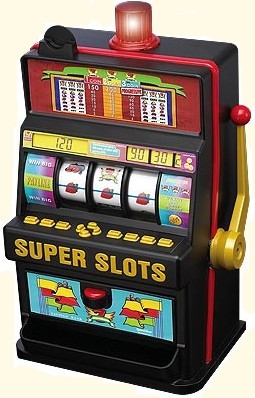
• Slot or not?
• The first slot machine: “Liberty Bell”
• Mechanical and electronic slot machines
• Payout mechanism
• Computerised slot machines
• Random?
• Are slots a good bet?
• Recommended casinos
• Slot clubs
• Slot resources on the web
Slot or not?
All other things being equal, just about the best advice you'll ever receive on this subject is:
DON'T
PLAY
SLOTS
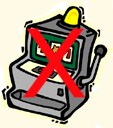
The range of the online slot house edges is about 2% up to 10%.
Compare this to a range of from 0% to around 0.3% for the blackjack games I recommend.
Bit of a no-brainer?
Actually, not necessarily. The house edge is only a part of the equation when considering your gambling budget and your hourly or daily expenditure levels - it's quite possible that a slot machine is just as good value for money as a blackjack game in the right circumstances.
I'll talk about this in more detail later.
(Page top)
The first slot machine: “Liberty Bell”
The mechanical slot was invented in 1887 by Charles Fay - the “Liberty Bell”:
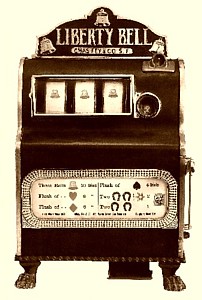
According to the history of slot machines (about.com), the jackpot, three Liberty Bells lined up, paid out the cracking sum of 50 cents. Not a great deal even by the standards of the late 18th century, but this slot machine was the first of its kind in that it paid out in actual money from the machine itself; earlier gambling machines had their prizes paid in the form of merchandise of some kind, most typically drink or tobacco from the bar where the machine was located.
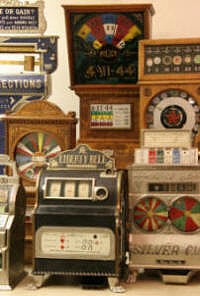
Mechanical and electronic slot machines
The basic concept of all mechanical slots is: a set of notched reels mounted on a central shaft, a handle to set them spinning and a braking mechanism to bring things to a standstill.
Here is a typical slot mechanism -
Pulling the handle brings the kicker and the control cam forward, and also pulls away the coloured stoppers which hold the reels in place. When the kicker reaches its outermost position a hook mechanism releases it, and its springs push it back towards the reels. Paddles attached to the kicker then strike the notches on the reels and set them off spinning.
While the kicker paddles are pushing the reels, the cam is returning to its original position, slowed with the aid of a gear mechanism. When it reaches this point it pulls the stoppers back into place. The catches on each stopper are so positioned as to cause the stoppers to brake each reel one after the other, rather than all together.
(Page top)
Payout mechanism
The payout on a basic mechanical reel slot machine is managed by the depth of the notches between each symbol, in combination with the stoppers and a shutter system:
When the stopper enters the deeper notch of the jackpot reel - see left-hand diagram - it moves sufficiently to allow the shutter to open far enough to release the coins. When the shallower non-jackpot notches are hit - see right-hand diagram - the stopper doesn't move far enough for the shutter to open and release.
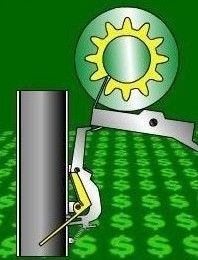
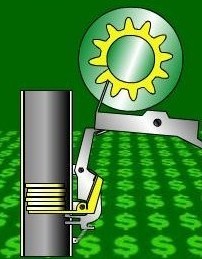
More sophisticated versions of this basic concept allowed differing payout amounts for the various reel combinations.
The mechanical mechanisms of the early machines eventually gave way to electrical equivalents, which made use of motors to spin the reels and electromagnetic systems to handle the payouts. The payouts were determined, as with the reel machines, by the spinning reels.
(Page top)
Computerised slot machines
Modern slot machines use computers to control all aspects of their functioning - motors, outcome and payout.
Probably the most crucial difference is the use of the computer's random number generator (RNG) to determine the outcome:
Random?
Technically speaking, the outcome of a slot spin is random insofar as the numbers generated by the RNG to determine the result are random. However, a closer look at the mechanism involved raises some questions as to whether or not the process involved meets our understanding of “random” as it applies to slots:
• When the button to spin the reels is pressed, the computer sets the motor in motion and selects numbers delivered by the RNG, one number for each reel. The number will be very large, somewhere in the region of nine or ten digits.
• Having selected a number, it then typically divides it by the number of entries on the “lookup table” (see below), and then selects the excess. To give an example of that: assuming the big number is 123,456,789 and the computer divides by lookup table number 64, it finds that 64 goes into the big number a total of 1,929,012 times, with 21 left over. It selects that 21 excess.
• The computer then finds the reel symbol to which 21 corresponds on the lookup table, and displays it.
Here's an example of a lookup table for an extremely basic 3-reel slot with just four symbols - three coloured 7s and a "blank":
| Lookup table | |||
|---|---|---|---|
| Stop number | Reel 1 | Reel 2 | Reel 3 |
| 1 | Blank | Blank | Blank |
| 2 | Blank | Red 7 | Blank |
| 3 | Red 7 | Blank | Blank |
| 4 | Blank | Blank | Red 7 |
| 5 | Blank | Blank | Blank |
| 6 | Blank | Blue 7 | Blank |
| 7 | Yellow 7 | Blank | Blank |
| 8 | Blank | Blank | Yellow 7 |
| 9 | Blank | Yellow 7 | Blank |
| 10 | Blank | Blank | Blank |
| 11 | Blue 7 | Blank | Blue 7 |
| 12 | Blank | Blank | Blank |
Numbers one to 12 down the left are the numbers the RNG will generate. As such, if it delivers 6, 2 and 4, the reels will display:
There is a grand total of just four symbols on these imaginary reels, each one occupying a quarter of the circumference of the reel. Consequently, they appear “equal”.
However, the weightings in the lookup table are anything but equal - each coloured seven is assigned just one number, with a total of three numbers for the three sevens out of the total of 12 numbers for each reel. The non-scoring blanks appear nine times on each reel.
As such, although the four symbols appear equal, the non-scoring blanks will appear three times more frequently than the three scoring symbols combined!
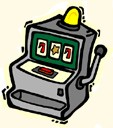
So are slots “random”?
I suppose the answer is: yes and no.
(Page top)
Are slots a good bet?
Earlier, I said that slots can be just as good value for money as a quality blackjack game in the right circumstances. What are those circumstances?
My gambling control system page outlines the importance of bet size in determining your expenditure levels. The crucial point with regard to slots is that the minimum bet available is almost invariably a great deal lower than the minimum bet for blackjack.
For the Microgaming single deck blackjack game the minimum is $5, compared to the minimum on many Microgaming slots of just one cent if you set coins and betsize to the lowest level - fully five hundred times lower than the blackjack minimum:
If you were to play 500 hands of $5 classic blackjack, house edge 0.1% with perfect play, you'd lose an average of $2.50.
500 spins of 1 cent slots, 5% house edge, would lose an average of only 25 cents!
At a slightly more realistic 15 cents per spin, the loss is still a reasonable $3.75.
These levels are comparable with the blackjack expense levels purely because the minimum slots bet is so much lower.
If you couple this with the fact that many slots have bonus rounds which can take a good mininute or two to resolve at no extra cost to the player, the speed of play and adherent loss rate are reduced even further.
You can also add the “no brain required” aspect of slots: other than inadvertently increasing your bet size, it's impossible to make a mistake with slots as all you do is click a button. Playing blackjack, mistakes are possible and do happen - I've made a few myself over the course of my playing career.
The only downside I can think of is that in order to maintain such low loss rates you have to ensure that your minimum bet doesn't start to drift up.
So, yes: in terms of hourly expenditure, slots can be as economic and more than blackjack. BUT: remember, you need to set your bet at a very low level to compensate for the vastly greater slots house edge.
(Page top)
Recommended casinos

♠ 32Red ♠
♠ Ladbrokes ♠
Although 32Red and Ladbrokes are probably the two safest casinos on the internet, my recommendation here is more to do with the fact that I'm reasonably familiar with Microgaming slots than any lack of reputability on the part of the other casinos I list.
As such, as long as you know your way around, I would recommend any of the casinos on my recommended casinos page.
(Page top)
Slot clubs
The online casino comps page explains the added cashback you get for your wagering in the form of comp points.
In online casinos this is a process which moreorless takes care of itself and points are awarded automatically - although it's always worth checking whether or not you need to enroll in a comp club before points are awarded.
In the event you ever play slots in brick & mortar casino, you'll definitely need to enroll - and casinos tend to not typically make this information readily available. However, a simple question to a member of staff should provide you with all the necessary information, such as where the club membership booth is located and the form to fill out.
You'll end up with a club card to insert in the machine - this is my MGM / Mirage club card, which is as good an example as any of the kind of thing you'll end up with:
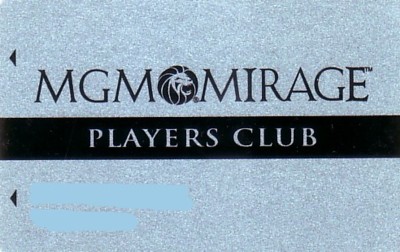
You'll need to insert the card into the appropriate slot in the machine you play; I've come a cropper with this process once or twice myself, so it might pay to check with one of the attendant personell that the card is inserted correctly and working, the first time you come to use it.
(Page top)
Slot resources on the web
 • The Wizard Of Odds
• The Wizard Of OddsSlot machines explained offers some introductory words on the mechanics of slots, along with a few pieces of advice and some myth-debunking for good measure.
How average return is calculated gives detailed explanations of the slot weighting mechanism by way of examples and calculations.
Actual Las Vegas return percentages lists the overall slot percentage return for casinos in Las Vegas. The numbers range between 85% and 93%.
• Slot Charts
Slot machine progressive graphs, values, and information is a unique resource that lists online casino jackpot levels in real time, and compares their current levels to their historic highs.
• Vegas Click
All about slot machines is not an exaggerated title: why you shouldn't play slots, the workings of slots, strategies for getting the most out of your play, progressive jackpots, myths and misinformation, probability of hitting a jackpot, payout percentages, a “challenge” offered to anyone who claims to have a slot-beating system, and quite a lot more besides. Micahel Bluejay's slot page is a goldmine of information, with a sardonic sense of humour running throughout.
• Wikipedia
Slot machine: slot history, description, terminolgy explained, reels and computerization, video slots, payout percentages and a lengthy section on legislation.
Progressive jackpot: the workings of progressives. This page also touches on advantage play on slots, in which, uniquely, the player has an edge but the casino still makes money.
• COCA
Coin Operated Collectors Association is an association for collectors of old slot machines. It was founded in 1997, they have an annual convention and hold various events during the year.
Page top
© 2005 - 2022 Hundred Percent Gambling